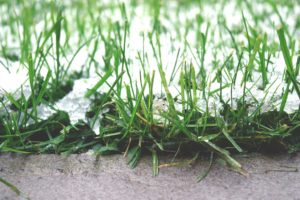
Learn more about the impact of cold weather on your lawn and how you can prevent long-term damage.
Every season has a particular impact on the health and appearance of your lawn. How does winter and its cold weather impact your landscape? Winter can be challenging, especially when you factor in extended periods of snow and ice. Freezing temperatures can have a detrimental impact on your grass. If you don’t prepare your lawn adequately in the fall, your property is more likely to experience long-lasting damage during winter. The impact of cold weather on your lawn may include brown or dead grass, desiccation, and snow mold damage. Learn more about these impacts with Scientific Plant Service so you understand how to protect your lawn this winter.
Brown or Dead Grass
When the winter frost and snow set in, your grass may turn brown and look dead. Most likely, your grass has just gone dormant. Even if your grass is covered in snow or ice, most of it will stay alive if you properly prepare it for winter with fall fertilization. In the spring, you will see if any areas of your lawn need to be reseeded to restore your lawn’s beauty.
Limit Lawn Traffic
Grass goes dormant for winter in all but the warmest regions. Protect grass plant crowns by limiting foot traffic. Avoid parking vehicles on lawns in winter.
Melt Ice Carefully
Choose ice melt products that are designed to be used around the lawn. Rock salt (sodium chloride) can damage plant roots when used excessively.
Potential Snow Mold Damage
A common grass disease during the winter months is snow mold. Preventative measures can be taken to reduce the risk of snow mold damage, but there is still a possibility it may develop. To help prevent snow mold, you can lower the height of the cut ½ to 1 inch. This will help keep the grass from becoming matted and susceptible to snow mold infection. Your Scientific Plant Service lawn experts can advise you on what to do if snow mold appears, but generally, snow mold will not have long-lasting effects on your landscape, especially when treated promptly.
Scientific Plant Service Is Your Go-To Source In Landscape Healthcare
Scientific Plant Service, located in Baltimore, is a privately owned corporation, chartered in Maryland in 1957 by Frank J. Burke. We started as a full-service Arborists specializing in the care of shade trees and ornamental shrubs, but today we are a Lawn Care company that is a huge part of the community. From aquatic environments and snow management to deer and mole control, SPS has services tailored specifically for your lawn and landscape.
We offer services in Maryland, Washington, DC, and Virginia, including: Harford, Baltimore, Carroll, Frederick, Howard, Anne Arundel, Montgomery, Prince Georges, Talbot, Queen Anne’s, Calvert counties in MD, as well as Loudoun County, Fairfax County, Arlington, Alexandria, and Falls Church in VA. For more information, contact us online, or call us at 410-321-0970. Be sure to follow us on Facebook, Twitter, LinkedIn, Instagram, and Pinterest.

